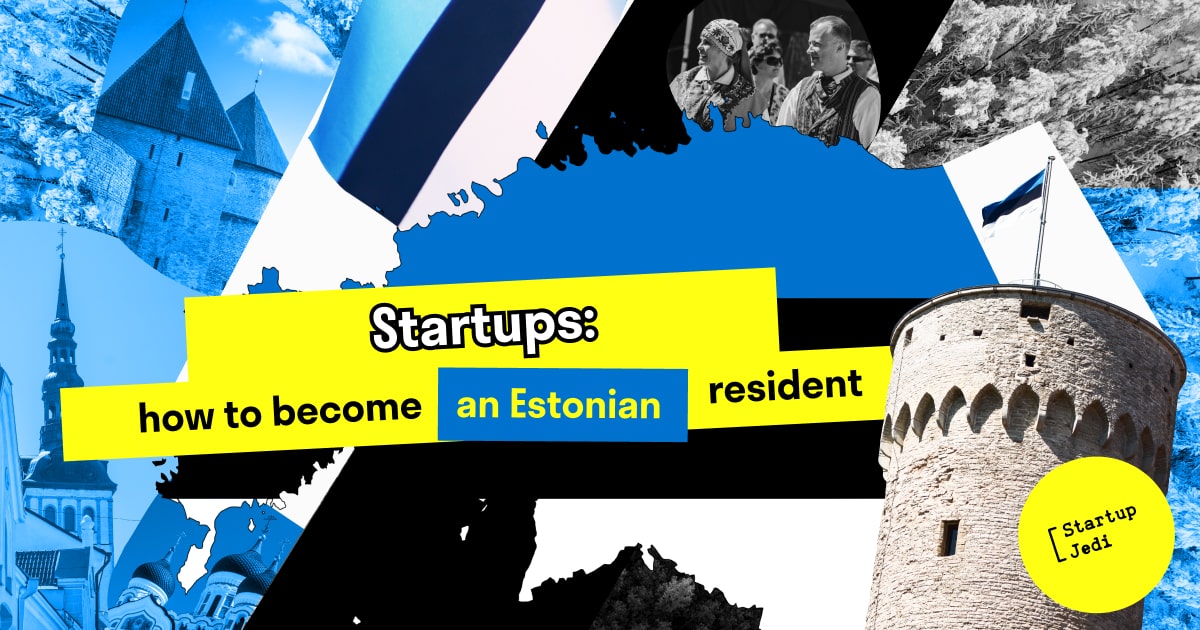
Startup Jedi
We talk to startups and investors, you get the value.

Startup Jedi
We talk to startups and investors, you get the value.
For post-Soviet countries, the possibility and fact of having a business abroad is still a feature that describes you as “classy”. Today, we’re going to talk about a simple and pretty cheap possibility to create a company in a country, which is a part of the European Union, and it is possible to conduct business as an EU resident. Are you intrigued already? Welcome to an article about e-residence in Estonia.

If we open the dictionaries, we will see that the term "residency" goes back to the Latin word "residentis" and defines a stable legal and economic connection between an individual and the state, which imposes rights and obligations on both parties. But the 21st century has brought a new term — "electronic residency". And that’s what we are going to talk about today.
A small country, both in area and in population, Estonia in the second decade of the 21st century decided to accomplish something previously impossible — to increase the number of residents (and no, they are not going to raise the birth rate or open borders for migrants). On December 1, 2014, the Estonian government allowed Estonian non-residents to gain access to Estonian government services, which include incorporation, banking, payment processing and taxation. Perhaps, we can say that then there were laid the first bricks for “digital nomads” — the people who use digital technologies for work, and eventually, nothing is tied to one country, even citizenship.
The first virtual or electronic resident of Estonia was Edward Lucas, the British journalist. Later on, Angela Merkel (2016) and Bill Gates (2018) became the participants of this program, too. According to the data for 2020, in general, 65 thousand people received the status of e-resident of Estonia, and eventually, they have created more than 10 thousand companies.

If you think that you have to book tickets to Tallinn to become an electronic resident of Estonia, then you can chillax; the entire process of filling out and submitting documents is happening online on the government website.
After filling out all the documents, they will be reviewed by the Estonian police and other government agencies that are responsible for the process of issuing an “electronic ID”. If you haven’t been involved in crime, including money laundering, then you will be able to receive an ID-card with a chip at the issuing point in a couple of months, and this will open the doors to the world of the Estonian ecosystem for you. Electronic residency is issued for a period of 5 years, and after this period it is necessary to re-fill the documents and pay the state fee.

The first to mention is the fact that e-residence doesn’t make you an Estonian citizen. If you want to come to Estonia or enter the territory of the European Union, you will need to go through all the visa procedures provided for citizens of the country, where you are an actual resident.
Secondly, e-residence in Estonia allows you to register a legal entity and register a bank account (although recently, you can use payment services instead of traditional banks, which are reinforcing the requirements).
Third, which has become the main reason why this article appeared on this resource, and not on a branch portal for drivers or doctors; most of the entrepreneurs in the IT field from developing countries (primarily Ukraine and Belarus) are one of the main target audiences of "electronic residency".
All company activities are happening online; from its opening to concluding contracts and receiving payments, which removes many logistics issues for entrepreneurs, since their main task is to create and develop a product or service, and not waste time on company service, as it is often the case in countries that occupy the low lines of the Doing Business rating.
Cybersecurity was one of the concerns of the “electronic residents” of Estonia, and indeed, those cards that were issued between October 16, 2014, and November 25, 2017, had problems with the security of the certificate. But all the owners who were at risk received a new generation of "electronic passports" by March 2018.

When establishing Estonia's e-residency, the government has announced the ambitious goal of 10 million e-residents by 2025, which is an enormous growth, given the fact that the total population of Estonia is over 1.3M people. For the government, new residents are attracting additional financing to the country, despite the fact that their taxation is rather modest, but not zero in all cases.
In addition, the e-residency portal has a section "Partner services", which contains the proposals of companies that facilitate the use of e-residency.

If you are reading this article, then probably, you are an IT entrepreneur from Ukraine or Belarus. This means that you should become an electronic resident of Estonia in order to get all the financial and legal opportunities of Estonian citizens. If you don't have your own startup yet, since it doesn't matter; incorporation isn’t a requirement for obtaining electronic residency.
At the same time, after opening a company in Estonia, you significantly simplify your work with the markets of the European Union and the United States (if you tried to work with these markets with a Ukrainian legal entity, then you know that it is extremely difficult or almost impossible).
Remember that the main entrepreneur’s concern should be the creation and development of a product or service, and not wasting time on bureaucratic procedures of the state mechanism, which will allow him to do this within the company. Estonian e-residency has set a high bar for this, which has not yet been surpassed by anyone.
We will continue to follow this governmental project and keep you updated on everything that is going on around the project!
Facebook: facebook.com/StartupJedi/
Telegram: t.me/Startup_Jedi
Twitter: twitter.com/startup_jedi
Comments